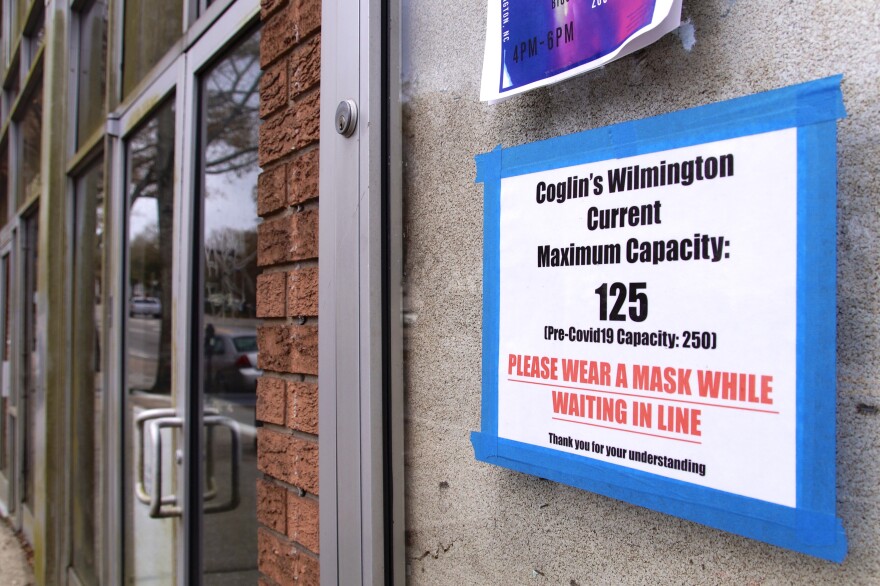In late 2019, Zack Medford opened a bar in downtown Wilmington. He named it Coglin’s — a coastal spin-off from his location in Raleigh. Then, the unexpected happened.
“On Primary Election day, Governor Roy Cooper announced the first preliminary case of the coronavirus or COVID-19..."
“All dine-in and bar areas are closed to the public. While the move allows takeout and delivery to continue, the financial impacts on the food and beverage industry will be severe..."
“One in four small businesses say they are two months or less from closing permanently due to the economic crisis caused by the coronavirus pandemic..."
After the initial shutdown in the spring, North Carolina officials announced an extended stay-at-home order through May.
They also announced the state’s projected reopening plan: Phase I would include retail shops, like boutiques and bookstores. Phase II would allow bars and restaurants to reopen at reduced capacity. And Phase III would usher in the reopening of entertainment venues like movie theaters or amusement parks.
But, when Phase II was implemented in late May, and restaurants were given the ever-so-cautious yellow light to reopen — bars were omitted, due to increased safety concerns. And, things mostly stayed that way.
So, Medford — like other bar owners across the state — had to come up with some creative solutions.
“If you wanted to survive 2020, you had to change your business model completely. You had to serve food in some way, or completely get rid of liquor and only have wine and beer, or open up as a grocery store. It was very complicated, very expensive.”
Bars were eventually allowed to reopen at 30% capacity, in September of 2020. But, that only applied to outdoor seating. So for many bars across the state — the lights remained off, the doors shuttered. And some saw financial relief through programs like PPP loans. But:
“...if you don't have a bar to pay people to work in, it doesn't really help to have payroll protection. I think we've lost dozens of bars, if not hundreds across the state, because of this way these restrictions were rolled out.”
Other business owners and sectors of the local economy have experienced better luck through the pandemic. Thanks to Wilmington’s unique assets — like its seaport, growing economy, diverse array of industry sectors, and tourism appeal — the region has seen more resiliency than other cities of its size.
“Not a single restaurant in the downtown market closed because of COVID. And there are very few in the outlying areas that did as well.”
That’s Terry Espy, President of Wilmington’s Downtown Business Alliance. One factor she attributes to Wilmington’s success is the Downtown Alive Program, which started in June 2020 and opened downtown streets for expanded restaurant seating during the pandemic.
That program came to a close in November. And Espy says after that, there were some concerns about what 2021 would bring.
“January and February are always low months in Wilmington. Every year we see a drop in those months. With the additional restrictions that were put in place, I don't think anyone was prepared for that.”
For example:
“I know retail saw a drop. And that usually that's the way it goes, especially in a tight downtown, if the restaurants are struggling, retail struggles. And if they fail, it impacts everything because you don't want to live in a downtown environment with closed-up buildings.”
As vaccine efforts ramp up and the state hopefully continues to see a gradual decline in COVID-19 cases, Espy says there is a lot of optimism moving into the summer. And a lot of companies are mostly planning on business as usual, with a few changes:
“We actually have restaurants that have converted their whole concept and just pick up and delivery. Two years ago, nobody would have done that, but now people understand we're not going to see a change in habits even after COVID has gone. And COVID may never be totally gone.”
And as the region heads into spring, bars have finally been brought back into the mix too. Last month, Governor Cooper announced that they could finally reopen indoors, at 30% capacity.
But Zack Medford — who ended up having to close his Coglin's location in Raleigh — says the move may have been too late for many other bar owners.
“You've got a lot of people who are able to reopen their bars now, but they're facing hundreds of thousands of dollars in back rent. And the question is, will they be able to pay off that back rent?”
But, for now, the music is back on inside of Coglin's Wilmington.
And, if you listen closely — maybe, just maybe, you can hear the sound of a potential return to normalcy.


